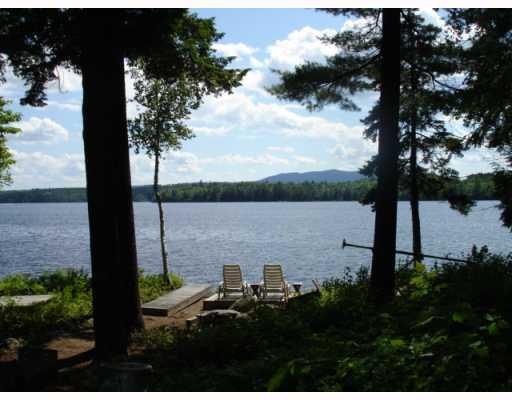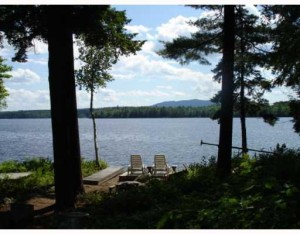Sebago Lake Region Residents Discuss Tar Sands Issue

Maine Lakefront Home on Cobbosseeconte is Absolute Cream Puff
May 30, 2013
Out and About for the Bangor Lakes Region of Maine June 6-12
June 5, 2013Sebago Lake Region Residents Discuss Tar Sands Issue

Highland Lake in Bridgton, looking toward Pleasant Mountain
Recently, citizens of Bridgton, Waterford, Sweden and Denmark, Maine, gathered at the Bridgton Community Center for an informational discussion led by Earl Morse of Waterford about tar sands bitumen. Dan Demeritt of Augusta, a Republican political consultant and public relations specialist, who grew up in Bridgton, was also present. He is a former campaign aide and communications director for Gov. Paul LePage.
Crooked River, which begins at Songo Pond in Bethel, meanders through North Waterford and Waterford on its way to Norway, Otisfield, Harrison, Casco and Naples, where it joins the Songo River before emptying into Sebago Lake. By canoe, the trip covers 47 miles. Along the way, flood wetlands with old oxbows and backwaters provide habitat for young landlocked salmon and brook trout. “It is the largest tributary to Sebago Lake and provides virtually all of the spawning habitat for wild landlocked salmon in the lake. Sebago Lake is famed for this fishery and supports nearly 40,000 angler days per year. Sebago Lake is one of only four watersheds that originally supported native landlocked salmon in Maine (the others are Green Lake, Sebec Lake, and West Grand Lake)” (www.mainerivers.org) And–Sebago Lake is the source of drinking water for the Portland Water District and about 15% of Maine’s population.
The river is one of the reasons many people from Maine and beyond purchase recreational or second homes in Waterford, where 52% of the taxpayers don’t reside in town year round. The same is true for the surrounding towns. Fishermen, hunters, hikers, snowmobilers, skiers and more come for the pristine waters and other recreational opportunities. Thus, the tax base is dependent upon “maintaining a recreationally attractive area with pristine waters.”
Mr. Morse explained that the residents of Waterford and several other towns along Crooked River have met with officials of Portland Pipe Line Corporation because the pipe line passes through their towns. It does not pass through Bridgton, but the residents will vote at town meeting on the following resolution: Question 2. Shall a resolution entitled “A Resolution to Protect the Health and Safety of Local Citizens, Water Bodies and Other Natural Resources in Relation to the Possible Transport of Tar Sands Oils through Maine” be adopted?
The pipe line was established in WWII as a war time emergency. Though Portland Pipe Line Corporation has no immediate plans to change the flow of conventional crude oil that currently travels from Portland to Montreal and instead bring tar sands bitumen that originates in the boreal forest of Alberta, Canada, from Montreal to Portland, it was reportedly stated by Larry D. Wilson, president and chief executive of the company, that they would welcome the opportunity to move the heavier oil through the line.
Mr. Demeritt reminded those gathered that the market is changing rapidly and the company is challenged by the fact that there may not always be an opportunity to ship tar sands from Montreal to Portland. He also confirmed that the oil is currently being transported though the state via train, as Maine stands between Montreal and a refinery in St. John’s, New Brunswick.
Tar sands oil is substantially different from lighter crude oils. It’s heavier molecular make-up has been described as being “like peanut butter.” Should a spill or leak occur, it would remain where it is for years. Also, given Maine’s winter weather, this solid would need additives in order for it to flow through the pipe line. That raised a question from local fire chief, Bob Wiser. As a first responder, Mr. Wiser questioned the fact that should an accident occur, his crew would not immediately know what chemicals they were dealing with because the company considers that information as proprietary. Though that makes sense from the company’s perspective, those gathered said it seems an unreasonable risk since the first responders wouldn’t know what they were breathing or what was sinking into the water.
It should be noted that this particular company has a good track record, though there have been a couple of leaks. In the June 17, 2012 Portland Press Herald article entitled “Maine pipeline has good safety record,” reporter Tux Turkel wrote “In 1960, a pipe break nearing a pumping station in Waterford sent oil running down a hill and into a small brook, according to news reports. The spill, estimated at 1,000 barrels, put an 8-inch coating of oil on the water.” Another spill, discovered by a Harrison resident, occurred in 2003.
According to Mr. Morse, most Waterford residents do not wish to close the pipe line down. They are “OK with the pipe line pumping crude north. The issue is that they don’t want to see the line reversed and tar sands moving through it.”
As lakefront property owners, we strongly encourage you to join us in trying to learn more about this topic.
To learn more about lakefront property sale on Highland Lake in Bridgton, click on the green box above.
To learn more about Highland Lake and Bridgton, click on the blog links below.
Enjoy Lakefront Living on Highland Lake in Bridgton, Maine
Bridgton, Maine, Offers Plenty To Do Throughout the Year

